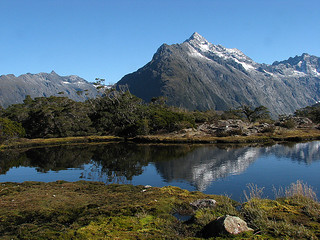| Key Summit - Routeburn Track (Dept of Conservation) |
A new report discussing the potential to move toward a green economy says New Zealand should "carefully review its direction of development".
The Royal Society of New Zealand's paper Facing the future: towards a green economy for New Zealand, was launched in Wellington this afternoon.
It highlighted research on the resource and consumption challenges facing New Zealand and the rest of the world and the opportunities for dealing with them, concluding that New Zealand could have a number of economic, social and environmental gains by accelerating its move to a green economy.
A green economy is defined by the United Nations Environment Programme as being resource efficient, low carbon and socially inclusive.
The paper noted that human consumption growth over the last century has had significant effects on the global environment, such as reduced water quality, loss of biodiversity and a changing climate.
"These environmental changes are not good for long-term sustainability and wellbeing," said Emeritus Professor Gerry Carrington, chair of the society panel that authored the report. "The panel agrees that New Zealand can avoid adverse consequences for the economy, society and the environment if it reconsiders its direction of development."
The paper noted New Zealand has several targets for reducing national net greenhouse gas emissions, including a 50 per cent reduction by 2050 compared with 1990. However, recent modelling by the Ministry for the Environment indicated that by 2040 New Zealand's net GHG emissions were expected to be 51 per cent higher than the 1990 baseline.
The Society says New Zealand is well positioned to become a green economy with its many natural advantages, such as extensive renewable energy sources.
"We also have many opportunities to increase our resource efficiency, which means improved productivity," Professor Carrington said.
"Many businesses and organisations are already aiming for sustainability. Communities are working together for change, and innovators and entrepreneurs are ready to grasp the opportunities of a greener economy."
The paper identifies a number of barriers that need to be overcome, such as the perception there are trade-offs between being economically competitive and being sustainable, and that a green economy might lead to a lower standard of living.
"The paper points to growing recognition of alternative indicators better suited than GDP for capturing the quality, quantity and sustainability of economic activity."
Sectors where research, new technologies and innovation would help moves to a green economy are also highlighted in the paper.
"Initiatives which bring together different interest groups, such as the Land and Water Forum, have shown that sustainable solutions can be generated by collaborative processes incorporating government, communities, businesses and individuals." The recently-announced Smart Grid Forum was another example.
Professor Carrington said the aim of the paper is to encourage the discussions that will help shape a sustainable future. "Becoming a green economy will require action and collaboration across all sectors of society. It's good that we are already seeing this happen."
The paper follows on from a major report released in 2012 by the University of Auckland Business School and consultancy Vivid Economics, which proposed an ambitious blueprint for "green growth".
It suggested mandatory emissions standards for new vehicles, an electrical "smart grid" and a stocktake of our clean green image and made recommendations for our major industry sectors, including tourism, agriculture and forestry.
The report backed improving standards and infrastructure to meet an influx of electric cars, urged investment in public transport and second-generation biofuels, and proposed mandatory light vehicle emission standards for new vehicles.
The Green Party welcomed today's new report. "The Royal Society has set out a credible, collaborative plan to transition our economy to a more sustainable footing," leader Russel Norman said. "With a smart, green economy, we can create good jobs while protecting our natural environment. This is a win-win economic plan that our Government should be supporting."
The Report: A Snapshot
* New Zealand would be advantaged by making a transition to a green economy, and is well positioned to start now to build on its existing strengths.
* New Zealand has a strong competitive advantage in renewable energy systems, and has many opportunities for growing low-carbon technologies and services.
* A number of New Zealand organisations are undertaking initiatives that increase the efficiency of resource use.
* Initiatives that support social inclusiveness, as exemplified by the land and water forum, have shown resilient and sustainable solutions are more likely to be generated by collaborative processes that incorporate government, communities, businesses and individuals.
* There is a need to engage the public and businesses in creating a vision for a resilient and prosperous future.
* New Zealand should establish strong research collaborations to support green innovation, and foster ways to incentivise and grow the production of low-carbon goods and services, improve efficiency, and manage demand.
* Long-term investments are needed in innovation, trialling new approaches, and supporting collaborations, in areas such as land use, energy supply and efficiency, transport and housing.
* The path to a green economy requires a well-informed and stable policy environment, especially for issues at the interface between economic development and environmental protection.


No comments:
Post a Comment